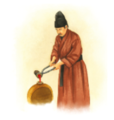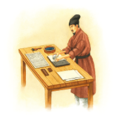2018 GGHS Team 1
Introduction
A comparison of the Technology of Goryeo and Foreign Countries
Motives for doing research
Through the study of hidden technology from the Goryeo Dynasty that many people do not know about, by comparing the characteristics of the cannons and metal types of the Goryeo Dynasty with those of foreign cannons and metal types, we explained the excellence of the technology of the Goryeo Dynasty. As a student at Ganghwa Girls ' High School in Ganghwa Island, which was the capital of Goryeo, we wanted to accumulate diverse knowledge about the Goryeo Dynasty. As of 2018, the research was conducted to mark the 1100th anniversary of the founding of the Goryeo.
Background knowledge
What is a cannon(Chongtong gun)?
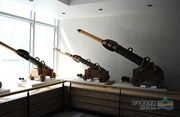
- A type of weapon used to fire arrows from the Goryeo Dynasty.
- The chongtong gun is a cannon ball of the Joseon Dynasty. The names were divided according to the size, weight of gunpowder, the number of bullets, and the distance to which they were used, according to the order of 천자문(千子文) was separated by 천(天)·지(地)·현(玄)·황(黃)
- A cannon is a large, uncarrying weapon with a large firing range and a greater range than the gun.
The stone cannon that was made in the 14th century was replaced by the steel one at the end of 15th century. At the same time in France a new lighter a cannon cast in bronze was placed on a horse-drawn motorcycle carriage, which led to the emergence of field guns. The new mobile French field gun has introduced the concept of a trunnion, making it easier for guns to be placed on permanent cartwheels, allowing for relatively accurate aim and range expansion.
The origin of the invention of metal types

Existing woodblocks were difficult to keep because they are easily split and bent. And all of the characters were carved on the woodblocks, and the characters were printed on one woodblock-printed book, so that only one type of book could be printed.Metal types were invented to compensate for these shortcomings.
Middle Ages
The physical principles of a cannon
When the magnitude of the force acting is the same, the longer the impact time, the greater the magnitude of the charge. Therefore, the formula F△t = I(the amount of charge) is established. For example, the longer the cannon is, the longer the shell flies. If powder is lit, impact will be applied to the shell, but the longer the gun is, the longer it will take to be impacted, causing the shell to fly further away.
European cannon

Among European cannons, a known internal structure was discovered in 1861, in Loshult, Sweden. It is believed to have been used in the 14th century and is a cannon barrel with a length of 310 mm and a muzzle of 36 mm. The internal structure of the cannon, which is made of bronze, becomes narrower as it enters from a gun and expands again in a medicine bottle that explodes. And there is a hole in the medicine box for inserting the ignition wire. It seems that guns with this internal structure were used in Europe around the 14th century. These guns used arrows as launches, with the wings of iron and leather attached to the middle of the arrows, which are well represented in the drawing of the book, which was published in 1326. At the shooting scene, the powder can be filled with powder in the medicine cabinet, the back of the arrow is inserted through the gun, and the powder can be set on fire. The arrow that is inserted into the muzzle by the explosive force is fired forward.
Chinese cannon
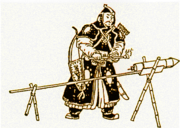
The cannon of the Goryeo Dynasty
<Kyung Hee Cannon> Kyung Hee Cannon is presumed to be independent. Among Korea's old cannons currently in existence, the cannon, which is believed to be made at the end of the Goryeo Dynasty, is two bronze cannon stored in the Kyung Hee University Museum. The cannon is a typical form of the 14th century, when it becomes narrower as it enters from the entrance and expands significantly in the area of gunpowder. The outer shape has a joint at the entrance to the beak and one at the front and one at the back of the gunpowder bottle.

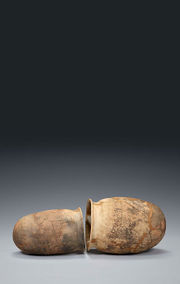
Kyung Hee cannon have the same internal structure as the Rochelt cannon in Sweden and China's 14th century cannon. However, it is different from the structure of the Korean cannon, which appears in the latter part of King Sejong. Therefore, Kyung Hee Cannon may be thought to be from China, but considering that the size of the artillery gun in the early period of China was 300 to 400 ㎜ or more than the Kyung Hee cannon, it is assumed the oldest cannon made in Goryeo.
The shooting sight of the cannon fills the medicine barrel of the cannon, inserts the back of the arrow through the gun, lights the signal line, and burns off the powder of the gun. The explosive force produces an arrow that is inserted into the barrel.
<juhwa> Choi Moo-seon also made the nation's first rocket, ' Juhwa ', which means ' Running Fire. ' "Juhwa " refers to putting gunpowder into a paper container made by rolling it, and the powder inside the paper barrel burns, and the combustion gases are blown back by force.
<general’s cannon,second commander’s cannon> As a distribution gun used to send arrows and bullets far away from the blast, it was used to strike and destroy enemy castles, gates, walls, and warships <A signal shell> This is a signal fire that can be used to set up a camp with the sound of explosion, fire and smoke that are emitted at launch, or exchange signals between the fortress and the camp.
Although none of the gunpowder manufactured by Choi Moo-seon can be confirmed on the scale and structure of the weapons, it is certain that they are the foundation of the nation's gunpowder weapons. Choi Moo-sun's contribution to the nation through the development of gunpowder and gunpowder weapons is beyond comparison with anyone's achievements.
German metal movable types
German metal type was invented by Gutenberg. Gutenberg invented the technology of type, taking advantage of his experience at the Mint in mainz.
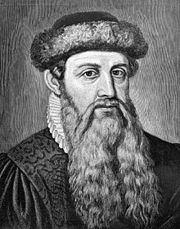
Printing with Gutenberg metal type is 1. Lead type making 2. Plate making 3. Ink application 4. Printing with printing press Gutenberg's metal types consisted of alloys of lead, tin, and antinomy, and melted alloys were poured into a finely molded type mold. The cast of type was kept in boxes divided into several columns and then placed on a small wooden frame, mounted on a typewritten rod, full of blocks. Gutenberg combined black ink, terepin and linseed oil to combine non-spreading ink. Gutenberg modified a wine compressor to make the first printing press. He used a typesetting stick to rearrange metal types to fit page strings and shapes. This was fixed in metal form and attached to the surface of the platen on top of the printing press. Then, put the paper on the plate, lower the weight of the bar soaked in ink, and push down on the hand - able heavy screw, so that the contents on the plate are evenly.

German metal types use lead that melts at 360 degrees, so everything is simple and type is made quickly. Also, Gutenberg's method of making metal types matched shape and size with thousands of castings thanks to the use of steel molds and casting machines. Even if the mold was broken, he could use a punch as much as he could. Because they made bumps on type and type and made it tight, even after making hundreds of prints, they rarely lost their type. In addition, it uses a press that used to weave old wine oil and others to facilitate mass printing. Good printing of type requires sufficient pressure, but the labor force had limitations. In the East, about 40 copies can be taken in one edition all day, but in the West, printing presses can produce several hundred copies a day. The European alphabet is basically 26. Even if you are case-sensitive and have a separate decorative font, you still have a limited number of types to make. Due to the nature of the alphabet, which states that voice can be written instantly, it was also easy to prevent illiteracy because it was possible to communicate only by knowing the alphabet and spelling out the words in one's own language.
In Germany, a former Western style printing pioneer, the book was much more practical in spreading culture through books, publishing and distributing the Bible for anyone to see after publication. As many people began to read the Bible, the irregularities of the church were discovered, and in 1517, a religious reform was carried out by Luther. Also, the upper classes, which accumulate wealth through industrial development, turned to education and eventually led to the eradication of illiteracy, thereby realizing democracy by intellectuals who started college and advanced education. As such, Gutenberg's influence was huge from the viewpoint of civilization and history.
Metal movable type from the Goryeo Dynasty
● Process for making metal types in the Goryeo Dynasty
① It is carved into the wax one by one letter to form 어미자.
② Wrap the wax and then form a mold.
③ Pour molten iron from copper, tin, and lead into a mold.
④ Remove and polish metal types made from molten iron.
⑤ Arrange the types according to what you want to print.
⑥ Put ink on the type face and paper over it.
● The character of metal type
It was made of metal so it could be stored for a long time.
It was able to print different kinds of books by combining type with metal letters.
Goryeo made the world's first.
It is a traditional craft that shows the excellence of our nation.
Modern times
Modern technology
3D Printer
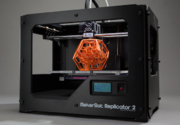
Today, a three-dimensional printer(3D - printer) has been created combining traditional printing technology with the wisdom of our ancestors. Three-dimensional printing is a manufacturing technique that produces three-dimensional objects by spraying a continuous layer of matter. By using this, they were able to create objects in three dimensions, not in two dimensions. [20]
Missiles

The rocket weapons, including cannon, have at present developed into missiles. A missile is a generic term for a weapon that is driven by a rocket, jet engine, etc. and is guided until the target is reached at the point of induction. A missiles don't just shoot at targets like shells and fly away.also it's got an induction device inside it After it's launched, it measures its speed and direction. Missiles have the ability to hit the target by as amended it. [22] [23] [24]
References
- ↑ 향토문화전자대전 http://www.grandculture.net/ko/Contents/Index
- ↑ https://terms.naver.com/entry.nhn?docId=2000469&cid=46717&categoryId=46763 [네이버 지식백과]고려시대 실물 금속활자 '복'
- ↑ 과학동아 http://dl.dongascience.com/magazine/view/S199504N032
- ↑ http://yoosi0211.tistory.com/entry/인류의-역사를-바꾼-중국의-화약-발명
- ↑ 과학동아 http://dl.dongascience.com/magazine/view/S199504N032
- ↑ [네이버 지식백과] 고려의 화약병기 - 함포전술로 해전 양상에 새로운 변화를 가져온 (무기의 세계) https://terms.naver.com/entry.nhn?docId=3573911&cid=59087&categoryId=59087
- ↑ [네이버 지식백과] 고려의 화약병기 - 함포전술로 해전 양상에 새로운 변화를 가져온 (무기의 세계) https://terms.naver.com/entry.nhn?docId=3573911&cid=59087&categoryId=59087
- ↑ 과학동아 http://dl.dongascience.com/magazine/view/S199504N032
- ↑ https://ko.wikipedia.org/wiki/%EC%9A%94%ED%95%98%EB%84%A4%EC%8A%A4_%EA%B5%AC%ED%85%90%EB%B2%A0%EB%A5%B4%ED%81%AC
- ↑ https://ko.wikipedia.org/wiki/%ED%99%9C%EC%9E%90
- ↑ https://terms.naver.com/entry.nhn?docId=1979515&cid=62347&categoryId=62395
- ↑ http://www.cheongju.go.kr/jikjiworld/contents.do?key=17512
- ↑ https://namu.wiki/w/%EC%9A%94%ED%95%98%EB%84%A4%EC%8A%A4%20%EA%B5%AC%ED%85%90%EB%B2%A0%EB%A5%B4%ED%81%AC
- ↑ https://terms.naver.com/entry.nhn?docId=1625305&cid=42192&categoryId=42209 [네이버 지식백과] 서양의 금속활자 인쇄 (인쇄 역사, 2013. 2. 25., 커뮤니케이션북스)
- ↑ http://www.ccdn.co.kr/news/articleView.html?idxno=506037#09SX
- ↑ https://cafe.naver.com/happyibook/475672 [네이버 지식백과] 인쇄기 [Printing Press] (1%를 위한 상식백과, 2014. 11. 15.) https://terms.naver.com/entry.nhn?docId=4368722&cid=59926&categoryId=59926
- ↑ [천재학습백과] 고려 시대 금속 활자 http://koc.chunjae.co.kr/Dic/dicDetail.do?idx=41175
- ↑ [네이버 지식백과] 세계를 놀라게 한 인쇄 기술 금속활자 https://terms.naver.com/entry.nhn?docId=3555669&cid=47305&categoryId=47305
- ↑ 최윤섭의 Healthcare Innovation|3D 프린터가 맞춤 의료에 불러온 파괴적 혁신들|2014.04.20| http://www.yoonsupchoi.com/2014/04/20/3d-printer-medical-innovation
- ↑ 프리미엄 조선|1000년간 가장 중요한 발명은 금속활자?|공미라(세계사 저술가)| 2014.02.21.|http://premium.chosun.com/site/data/html_dir/2014/02/20/2014022004605.html
- ↑ [123RF] 하늘에서 미사일의 3d 그림 (Esteban De Armas) https://kr.123rf.com/%EC%8A%A4%ED%86%A1%EC%82%AC%EC%A7%84/%EB%AF%B8%EC%82%AC%EC%9D%BC.html?imgtype=0&alttext=1&cko=1&start=400&sti=nul22rnd7fnyrzsgqv%7C&mediapopup=61674362
- ↑ [네이버 지식백과] 미사일 [missile] (21세기 정치학대사전, 한국사전연구사) https://terms.naver.com/entry.nhn?docId=727167&cid=42140&categoryId=42140
- ↑ [한국과학기술인연합] 화약과 로켓무기의 발달사 최성우) http://www.scieng.net/column/6687
- ↑ [네이버 지식백과] 미사일 (시사상식사전, 박문각) https://terms.naver.com/entry.nhn?docId=73115&cid=43667&categoryId=43667
Team Information
| Team Position | Name (English) | Name (Korean) | Student ID | Wiki ID |
|---|---|---|---|---|
| Teacher | Lina | 리나 | myid1 | |
| Leader | Yerim Kim | 김예림 | 2704 | yearim205 |
| Member | Jeonga Park | 박정아 | 2707 | qkrwjddk |
| Member | Sumin Yu | 유수민 | 2613 | 유수민 |
| Member | Hyoeun Kim | 김효은 | 2505 | rlagydms |
| Member | Yeaeun Lee | 이예은 | 2416 | Yeaeun |
| Member | Hyewon Shin | 신혜원 | 1611 | 신혜원 |
- Each student should make their own page named 2018 GGHS Team# NAME, for example: 2018 GGHS 1 Lina.



